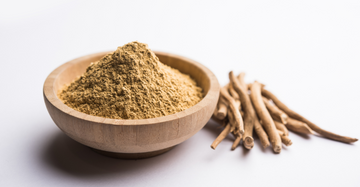Ashwagandha, also known as Withania somnifera, is an adaptogenic plant that has been used for centuries in traditional Indian medicine. Its benefits on women's health are varied and have been studied by numerous scientific researches.
In this article, we will explore how ashwagandha can be beneficial for women in different aspects of their health.
Ashwagandha and its benefits for women
Ashwagandha has traditionally been used to improve overall health and well-being. Additionally, it is believed to have specific properties that can help address the most common health problems in women. Below, we will explore some of the benefits that ashwagandha can offer women.
One of the most notable benefits of ashwagandha for women is its ability to help balance hormones. Hormonal fluctuations are common in women and can cause a variety of uncomfortable symptoms, such as mood swings, fatigue, and sleep problems. Ashwagandha has traditionally been used to help regulate hormones and reduce these symptoms.
Another important benefit of ashwagandha for women is its ability to reduce stress and anxiety. Many women experience high levels of stress due to the multiple responsibilities and demands of daily life. Ashwagandha has been shown to have adaptogenic properties, meaning it can help the body adapt and respond better to stress. This can result in a reduction in stress symptoms and an overall feeling of calm and well-being.
In addition to its effects on hormones and stress, ashwagandha may also be beneficial for women in terms of sexual health. This herb has been shown to help increase libido and improve sexual function in women. This can be especially helpful for those experiencing issues related to lack of sexual desire or sexual dysfunction.
Ashwagandha may also have positive effects on women's mental health. This herb has been shown to improve mood and reduce symptoms of depression. Additionally, it may help improve memory and concentration, which may be beneficial for those women experiencing cognitive difficulties.
What is ashwagandha used for in women?
Ashwagandha can be beneficial for women in a variety of ways. It has been shown to help reduce stress and anxiety, thereby improving mental and emotional health. Additionally, it can help balance hormone levels in women, which is especially beneficial during menopause and PMS.
In addition to these benefits, ashwagandha may also be helpful in improving sleep quality in women. Many women experience difficulty falling asleep or staying asleep at night, which can have a negative impact on their overall health. Ashwagandha has been shown to have sedative and relaxing properties, which can help promote quality, restful sleep.
Another benefit of ashwagandha for women is its ability to strengthen the immune system. During certain stages of life, such as pregnancy or breastfeeding, women may experience a decline in their immune system, making them more susceptible to illnesses and infections. Ashwagandha may help strengthen the immune system, providing additional protection against disease and promoting optimal health.
What is the relationship between ashwagandha and female fertility?
Some studies suggest that ashwagandha may help improve fertility in women by balancing reproductive hormone levels and improving egg quality. However, more research is needed in this field to confirm these findings and determine the optimal dose and treatment time.
Ashwagandha, also known as Withania somnifera, is a medicinal plant that has been used for centuries in traditional Indian medicine, known as Ayurveda. It is believed to have adaptogenic properties, meaning it can help the body adapt to stress and promote overall balance in the body.
In relation to female fertility, it has been observed that ashwagandha can have positive effects on several key aspects. For example, it has been shown to help regulate the levels of reproductive hormones, such as estrogen and progesterone, which play a crucial role in the menstrual cycle and ovulation.
Additionally, some studies have suggested that ashwagandha may improve egg quality by reducing oxidative stress and protecting reproductive cells from damage caused by free radicals. This is especially important, since the quality of the egg is a determining factor in fertility and the chances of conception.
It is important to note that while there is promising preliminary evidence for the effects of ashwagandha on female fertility, more research is needed to support these claims and establish clear guidelines on its use.
Regarding the optimal dose and treatment time, a consensus has not yet been established. Some studies have used ashwagandha doses ranging from 300 mg to 600 mg per day, while others have used more concentrated extracts. Additionally, the duration of treatment can vary from a few weeks to several months.
Ashwagandha and its sexual benefits for women
Ashwagandha, also known as "Indian ginseng", is a medicinal plant that has been used for centuries in Ayurvedic medicine. It has gained popularity in recent years due to its numerous health benefits, including its positive effects on women's sexual health.
One of the most notable benefits of ashwagandha is its ability to reduce stress. Chronic stress can negatively affect libido and sexual satisfaction in women as it can decrease levels of sex hormones such as estrogen and progesterone. However, ashwagandha can help balance hormones and reduce stress levels, which in turn can increase sexual desire and improve intimacy satisfaction.
In addition to its effect on stress, ashwagandha may also have a positive impact on women's hormonal health. By regulating the levels of hormones such as estrogen and progesterone, it can help improve sexual function and promote a healthy sexual response. This can translate into increased sexual desire, greater vaginal lubrication, and greater satisfaction during intimate relationships.
Scientific studies have supported these sexual benefits of ashwagandha in women. In a study conducted on women with sexual dysfunction, ashwagandha supplementation was found to significantly improve sexual arousal, vaginal lubrication, and orgasm. Another study found that ashwagandha increased libido and improved sexual function in postmenopausal women.
In addition to its sexual benefits, ashwagandha also offers other health benefits for women. For example, it has been shown to have antioxidant and anti-inflammatory properties, which may help protect against premature aging and reduce the risk of chronic diseases such as cancer and heart disease. Ashwagandha has also been noted to improve cognitive function and help reduce symptoms of depression and anxiety.
What type of women can take ashwagandha?
Ashwagandha is considered safe for most women. However, it is important to keep in mind that each person is different and may react uniquely to supplements. If you are pregnant, nursing, or have any pre-existing medical condition, it is necessary to consult a healthcare professional before starting to take ashwagandha.
As for women, ashwagandha can be especially beneficial at certain times in life. For example, during pregnancy, many women experience hormonal changes and elevated stress levels. Ashwagandha can help balance hormones and reduce stress, which can be beneficial for both mother and baby.
Additionally, ashwagandha can also be helpful during the menopause stage. During this transition period, many women experience symptoms such as hot flashes, mood swings, and trouble sleeping. Ashwagandha can help relieve these symptoms and improve overall quality of life.
It is important to note that while ashwagandha is considered safe for most women, each person is unique and may have different reactions to the supplements. For this reason, it is advisable to consult a health professional before starting to take ashwagandha, especially if you are pregnant, nursing, or have any pre-existing medical conditions.
How Ashwagandha Helps Women Manage Stress?
Stress management is crucial for women's health. Ashwagandha has been shown to have adaptogenic properties, meaning it can help the body adapt and resist stress. It can reduce levels of the stress hormone cortisol and promote a feeling of calm and relaxation.
Ashwagandha contains bioactive compounds, such as withanolides and withaferin, which have adaptogenic properties. These compounds can help the body adapt and resist stress, while promoting overall balance in the nervous system.
One of the ways ashwagandha helps women manage stress is by reducing cortisol levels. Cortisol is a stress hormone that is released in response to stressful situations. High levels of cortisol can have negative health effects, such as increasing blood pressure and suppressing the immune system.
Ashwagandha has been shown to have regulatory effects on cortisol levels. Several studies have found that ashwagandha supplementation can reduce cortisol levels in the body, which in turn can help reduce symptoms of stress and promote a feeling of calm and relaxation.
In addition to reducing cortisol levels, ashwagandha may also help women manage stress by promoting a healthy stress response. When we are faced with a stressful situation, our body releases stress hormones, such as cortisol and adrenaline, to help us cope with the situation.
Ashwagandha may help regulate the stress response by balancing stress hormones and promoting a healthier response. This can help reduce symptoms of stress, such as anxiety and fatigue, and promote an overall sense of well-being.
How Ashwagandha can improve women's mental health?
Mental health is an important aspect of overall health. By reducing stress and promoting relaxation, ashwagandha can help improve mood and reduce symptoms of depression and anxiety. In addition, it has been observed that it can improve memory and cognitive ability in general.
Adaptogens are natural substances that help the body balance itself and maintain homeostasis. Ashwagandha is one of the most popular adaptogens and has been used to treat a variety of conditions, including stress, anxiety, depression, and fatigue.
How can Ashwagandha help with better quality of sleep?
Adequate sleep is crucial for good physical and mental health. Ashwagandha can reduce stress levels and promote a feeling of calm, which can help you fall asleep more easily.
Chronic stress can negatively affect sleep quality, causing insomnia and difficulty falling asleep. Ashwagandha acts as a calming agent, helping to reduce levels of the stress hormone cortisol in the body.
In addition to its calming effect, ashwagandha may also improve sleep quality by increasing levels of hormones involved in sleep regulation and circadian rhythm. These hormones include melatonin, which is responsible for regulating the sleep-wake cycle, and GABA (gamma-aminobutyric acid), a neurotransmitter that promotes relaxation and helps you fall asleep.
Ashwagandha may also help relieve symptoms of anxiety and depression, which are often associated with sleep problems. Anxiety and depression can make it difficult to fall asleep and maintain deep, restful sleep. By reducing stress levels and promoting a feeling of calm, ashwagandha can help relieve these symptoms and improve sleep quality.
How Ashwagandha can improve women's cardiovascular health?
Cardiovascular health is important for everyone, including women. By reducing stress, improving hormonal health, and having anti-inflammatory properties, ashwagandha may help improve heart health and reduce the risk of cardiovascular disease in women.
How Ashwagandha can help with inflammation in women?
Chronic inflammation can be detrimental to overall health. Ashwagandha has been shown to have anti-inflammatory properties, meaning it can help reduce inflammation in the body. This may be especially beneficial for women who suffer from inflammatory conditions, such as arthritis or irritable bowel syndrome.
How Ashwagandha can improve skin health in women?
The skin is the largest organ in the body and reflects overall health. Ashwagandha has antioxidant properties, meaning it can protect the skin against free radical damage and promote a healthy appearance. Additionally, it can help reduce signs of aging, such as wrinkles and dark spots.





